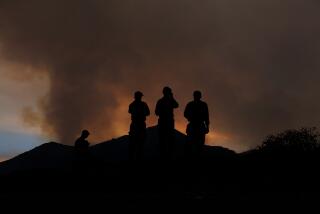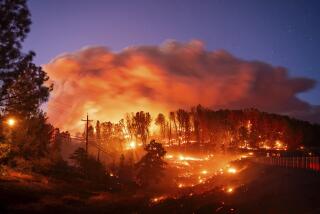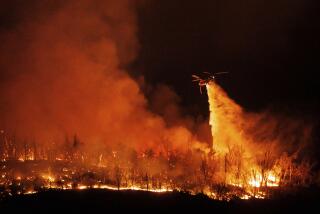Month-old wildfire expected to linger near Santa Barbara
- Share via
LOS PADRES NATIONAL FOREST — For more than a month, it’s been the wildfire that whispers and then roars.
On some days, flames settle into the rugged terrain and barely anyone notices. But on Saturday, the fire raced through the tinder-dry chaparral, for a time threatening rural homes and blanketing Santa Barbara with a grimy film of ash and soot.
Fire officials now predict that the massive wildfire in Santa Barbara County’s rugged wilderness will continue to burn until early September, persisting nearly all summer, from the Fourth of July past Labor Day.
Thick brush that hadn’t burned in more than a century is fueling the blaze, which has charred more than 44,000 acres — about 70 square miles — of Los Padres National Forest. The fire was sparked July 4 by equipment used to repair a water pipe.
On Friday and Saturday, smoke and ash descended on Santa Barbara, about 10 miles away, and other cities along the coast.
The smoke marred Santa Barbara’s Old Spanish Days Fiesta, the city’s biggest celebration of the year, which runs five days and ends today. Some of those celebrating along State Street on Friday night wore face masks.
Smoke contains tiny particles of soot that can trigger respiratory and heart problems, so county officials issued a health alert, encouraging people in smoky areas to limit their time outdoors.
“If you smell smoke, be cautious and use common sense to protect your family’s health,” said Santa Barbara County Health Officer Dr. Elliot Schulman.
On Friday, Gov. Arnold Schwarzenegger declared a state of emergency to free up state resources to help fight the fire.
So far, no structures have burned, but firefighters are stationed in rural neighborhoods to clear brush and protect homes. Residents of about 175 rural houses on Paradise Road and campers and visitors in the forest — including a county-run camp for delinquent boys — were evacuated Friday afternoon.
It is the fire that won’t go away.
For several days last week, weather conditions — a low inversion layer that brought stagnant air — slowed its advance, but that suddenly changed Friday. Winds picked up, spreading the fire south and east. It was 80% contained last week, but just 60% on Saturday.
“It’s playing cat and mouse with us,” said Manuel Madrigal, a fire information officer. “We think it’s laying down and we hope to get it pinched off, and then weather changes happen and it’s off to the races again.”
Madrigal said it is unusual for fires to last more than 30 days.
The crews are digging fire lines only to see embers fly over them and ignite other brush.
“That part is frustrating. You sweat all day to build this really nice line, then later that afternoon, adios — the fire jumps the line and then you regroup and start all over again,” Madrigal said.
Chaparral and other shrubs are providing ample fuel for the flames after one of the driest years on record along the Central Coast.
“What started from one spark has kind of turned into a force of nature,” said Eli Iskow, a spokesman for the Santa Barbara County Fire Department.
Fire officials reported Saturday that much of the brush was dead or extremely dry, and “a continuous fuel bed lies ahead of the fire’s main direction of spread.”
“There is a high probability of the fire increasing significantly in size,” their statement said.
Fire information officer Rich Phelps said the moisture in the brush was only 40%. Anything below 60% is deemed critical. He also said officials were seeing “100% probability of ignition,” which means if a spark lands somewhere, it will burn.
“It’s been hot and dry, so it’s not going out, it’s not going out,” Phelps said.
Making matters worse, the jagged, roadless terrain makes it difficult to use firefighting vehicles in most areas except to reinforce contingency lines in brush-free spots. In addition, bulldozers are not permitted in federally designated wilderness areas without special permission, which has not been sought.
“From above it looks like a bucketful of shark’s teeth. It’s that jagged,” said Santa Barbara County Fire Chief John Scherrei.
About 50 crews are attacking the fire’s flanks by hand while air tankers dump water on it. Firefighters were in place to protect homes and other structures in the Paradise and Peachtree Canyon areas.
“It’s just one of those fires where you can’t put people on steep terrain,” said firefighter Sam Hall of Kernville, who was helping to clear brush around homes along Paradise Road.
Fighting the fire has already cost an estimated $46 million.
With about 1,800 firefighters at work, a huge command post has been set up with catered meals, Internet connections and laundry facilities because crews are there so long: 14 days at a time.
The smoke was visible throughout the valley. From Highway 154, two columns of dense, gray smoke were rising in a clear blue summer sky.
Alex Jimenez, 14, who headed to downtown Santa Barbara on Saturday afternoon after a youth soccer game, said he worried about the residue from the fire when he plays.
“You get tired really quick,” he said. “It’s hard to play.”
The Fiesta went on as scheduled, with many residents and visitors taking it in stride, confident the fire wouldn’t cross the mountains and reach Santa Barbara.
Still, the smoke and ash were annoying.
“I came here Fourth of July for the fireworks, and the fire’s still going on,” said Gena Hernandez, a visitor from the San Francisco Bay Area.
At the Fiesta, cars were covered with white ash, and black clothing took on a salt-and-pepper look. The worst of it came Friday evening.
“I had it all over my head, all over the clothes. If you looked up into the sky, there was big black smoke all the way to the mountains,” said one man who was selling clothes at a street-side stall.
Comments? Email travel-feedback@latimes.com
More to Read
Sign up for The Wild
We’ll help you find the best places to hike, bike and run, as well as the perfect silent spots for meditation and yoga.
You may occasionally receive promotional content from the Los Angeles Times.







